Sustainability Forum 2022, hosted by Tsinghua University School of Economics and Management (Tsinghua SEM), London Business School (LBS), and Asian Infrastructure Investment Bank (AIIB), was organized online by the Institute for Global Development at Tsinghua University (Tsinghua IGD) on September 15, 2022.
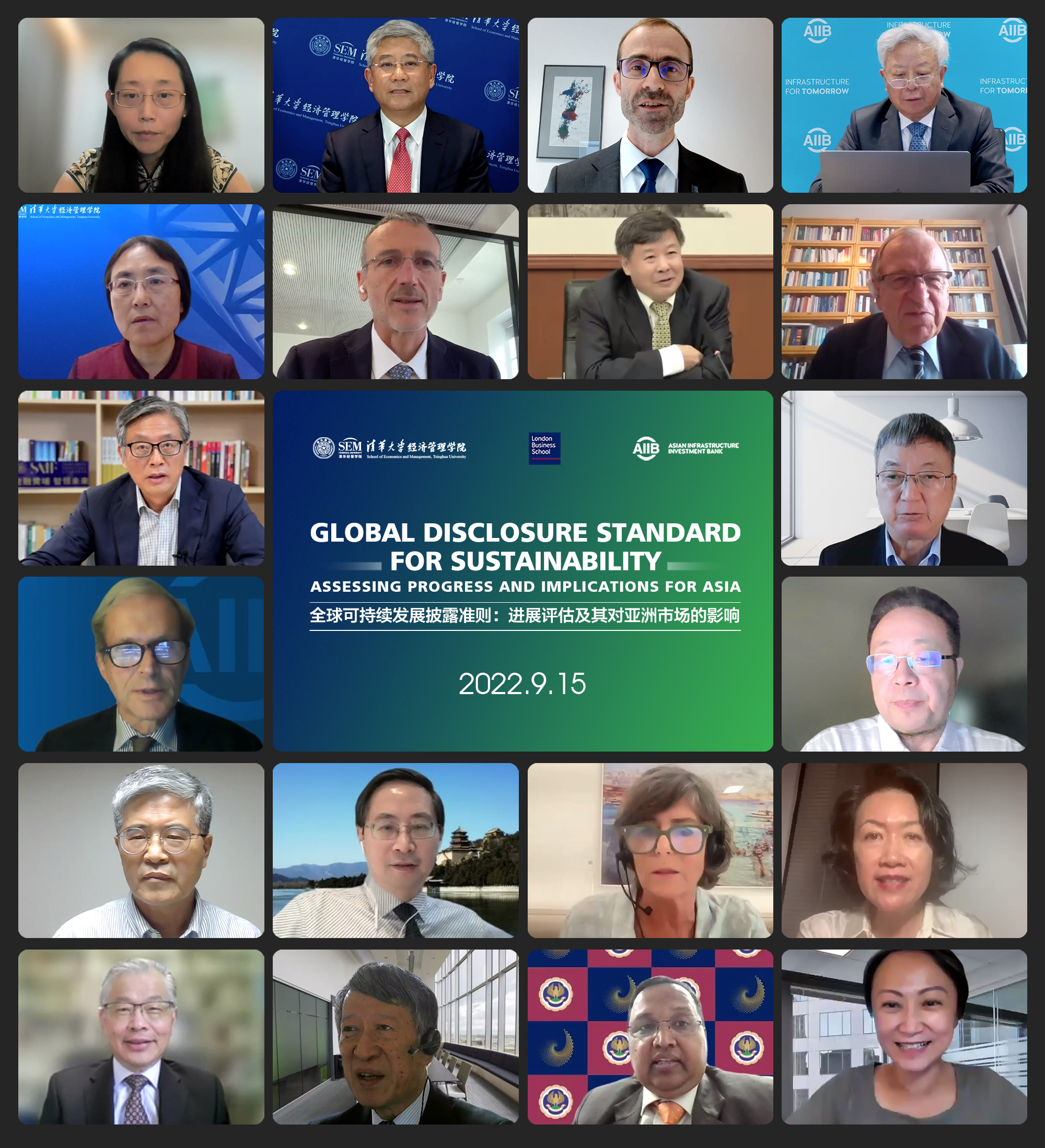
Speakers at Sustainability Forum 2022
Discussion centered on the topic "Global Disclosure Standard for Sustainability: Assessing Progress and Implications for Asia." Policymakers, academic experts, and market actors in Asia met to discuss sustainability-related issues and to comment on the first draft of International Sustainability Disclosure Standards (ISDS) published by International Sustainability Standards Board (ISSB) and its impact on the Asian market.
BAI Chong-En, Mansfield Freeman Chair Professor, dean of Tsinghua SEM and executive deputy dean of Institute for Global Development at Tsinghua University; François Ortalo-Magné, professor and dean of LBS; and JIN Liqun, president and chair of the Board of Directors of AIIB, delivered opening remarks. Professor XIAO Xing, head of Accounting Department, Tsinghua SEM, moderated the session.
In his speech, BAI Chong-En said sustainable development is a global issue that requires urgent action from all parties. Universities can participate in research, exchange, education and outreach. Tsinghua SEM is actively researching key issues related to global development, offering ESG and sustainability courses, encouraging students and entrepreneurs to think about the environment and promoting collaboration between business, academia, and researchers to spur technological innovation. According to BAI, in order to achieve the carbon neutrality goal and sustainable development, all societal sectors must cooperate, share ideas internationally, pool their knowledge, coordinate their efforts and reach a consensus, BAI said. The forum would be an excellent place to start, he said.
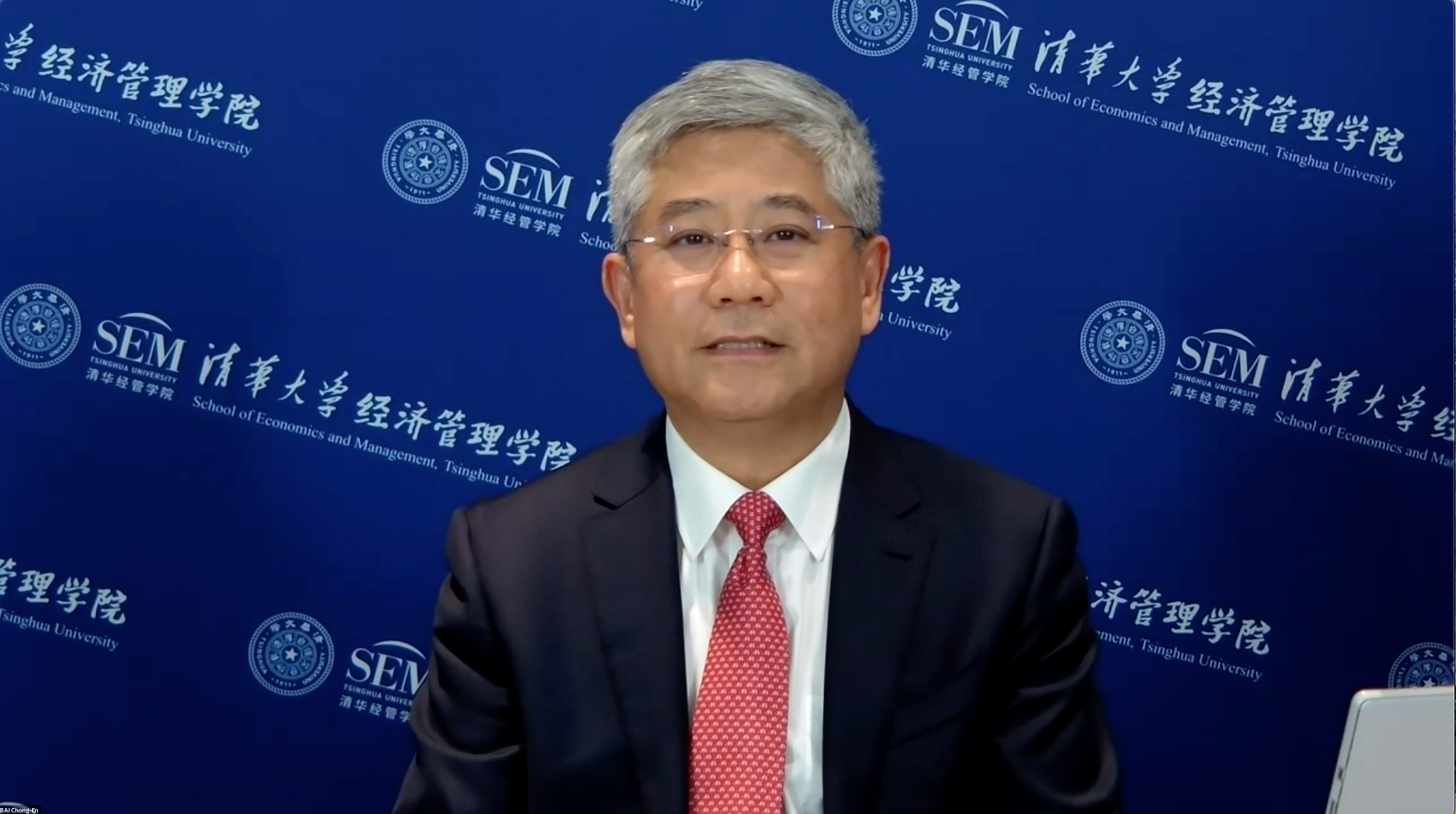
BAI Chong-En
François Ortalo-Magné spoke about ESG disclosure from a research standpoint. He said ESG disclosure has significant ramifications for businesses, the investment community, regulators and consumers, and he cited research from LBS to demonstrate how crucial ESG disclosure is to reducing the problem of corporate green-washing and facilitating the market's information flow.
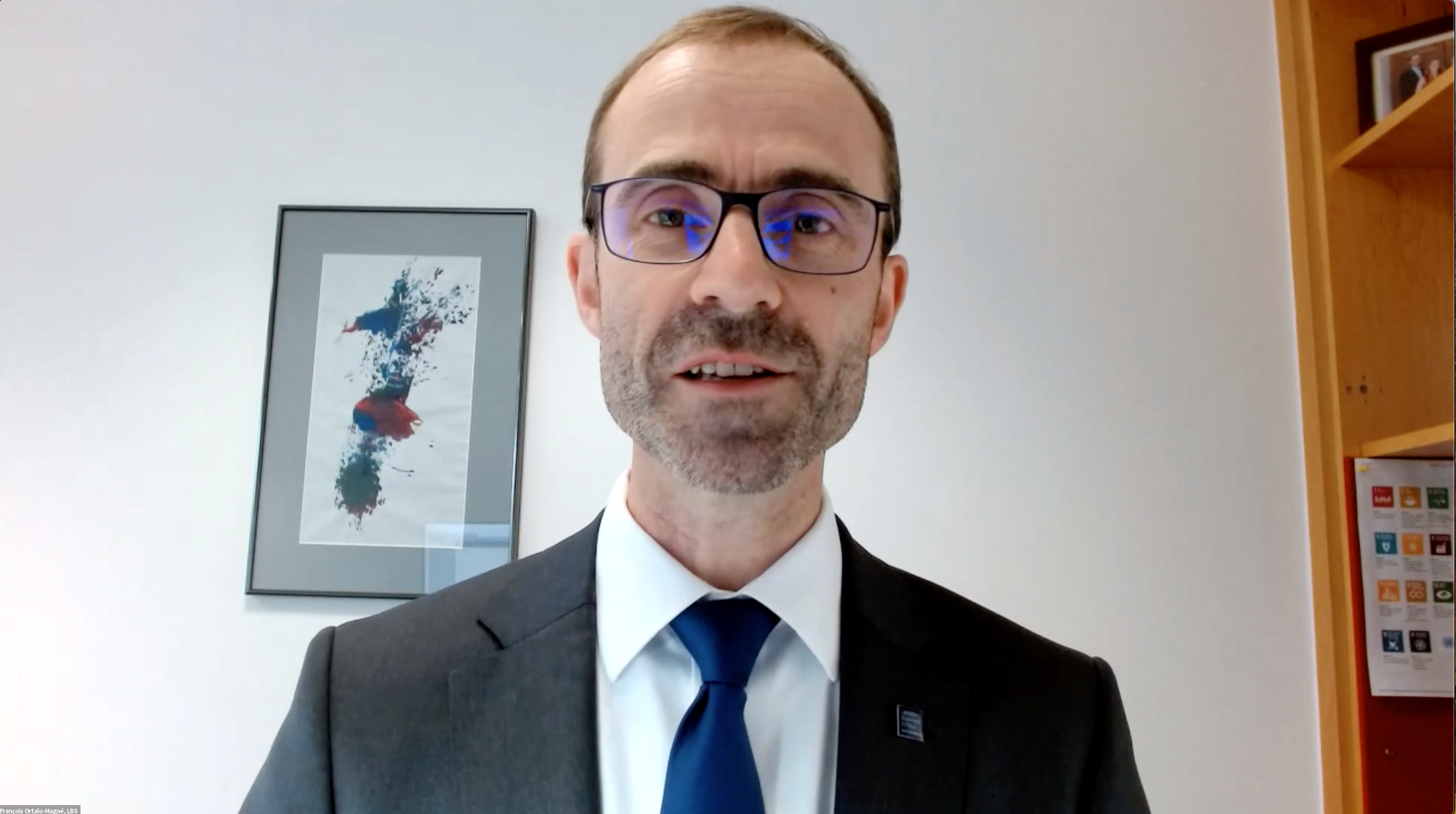
François Ortalo-Magné
JIN Liqun called for global agreement and decisive action to deal with the triple planetary crises of climate change, biodiversity loss, and pollution. AIIB is built upon three enduring values: "Lean, Clean and Green." It is dedicated to supporting economically and socially viable infrastructure projects in Asia, with a target of ensuring that 50 percent of overall approved financing by 2025 will be directed toward climate finance, JIN said. AIIB has been committed to transparency, integrity and accountability since day one, he said.

JIN Liqun
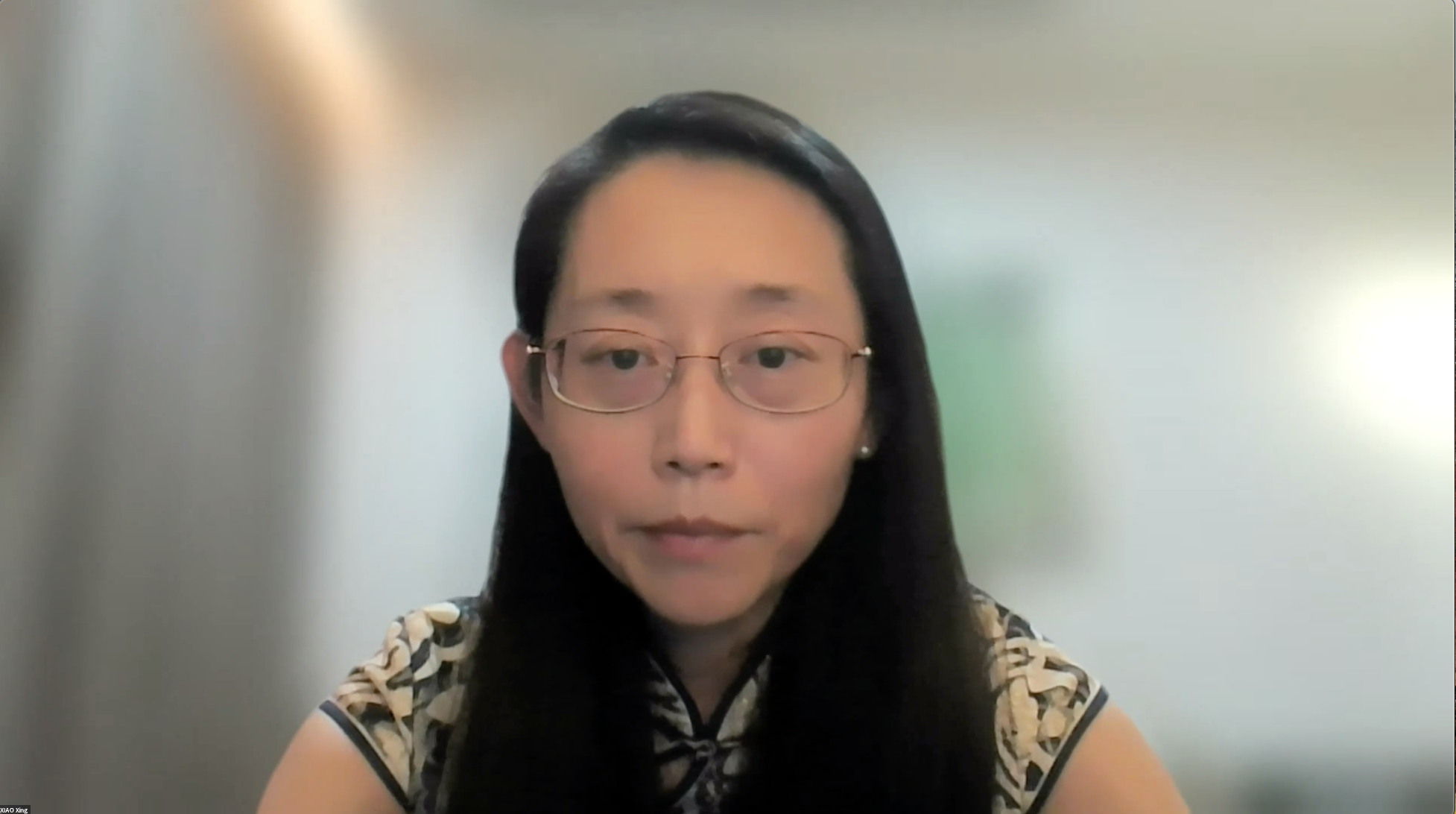
XIAO Xing
Emmanuel Faber, chairman of ISSB, delivered the keynote address to introduce ISSB and its first proposed set of Sustainability Disclosure Standards. The session was moderated by QIAN Xiaojun, professor at Tsinghua SEM, associate dean of Schwarzman College and director of Research Center for Green Economy and Sustainable Development at Tsinghua University.
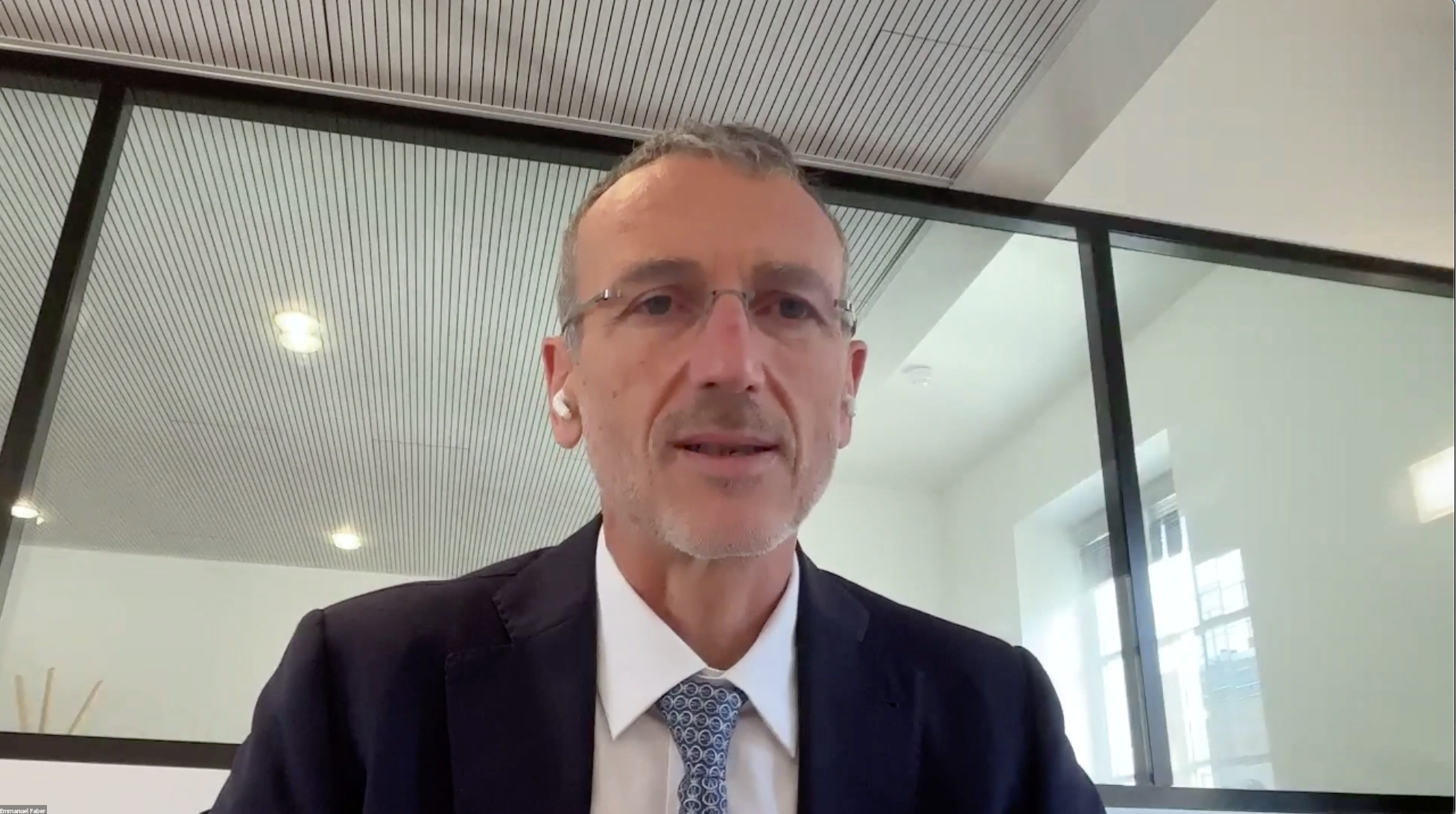
Emmanuel Faber
ISSB was given a mission by the International Financial Reporting Standards Foundation (IFRS) to develop a global benchmark standard for sustainable disclosure to meet the information needs of investors when assessing the value of a company. Emmanuel Faber began his presentation by reviewing the history of ISSB's creation and the mission. Countries from across the world have already provided feedback on the first drafts, which cover topics such as industry standards, implementation, and disclosure down the value chain. In the upcoming phase, the ISSB will compile and analyze input to improve convergence and interoperability with the standards of the EU and US. Faber offered three suggestions to players in the Asian market: prepare early to seize opportunities and attract capital; learn more from one another, particularly by utilizing digital technology to go green; and concentrate on capacity building and engage in international benchmarking.
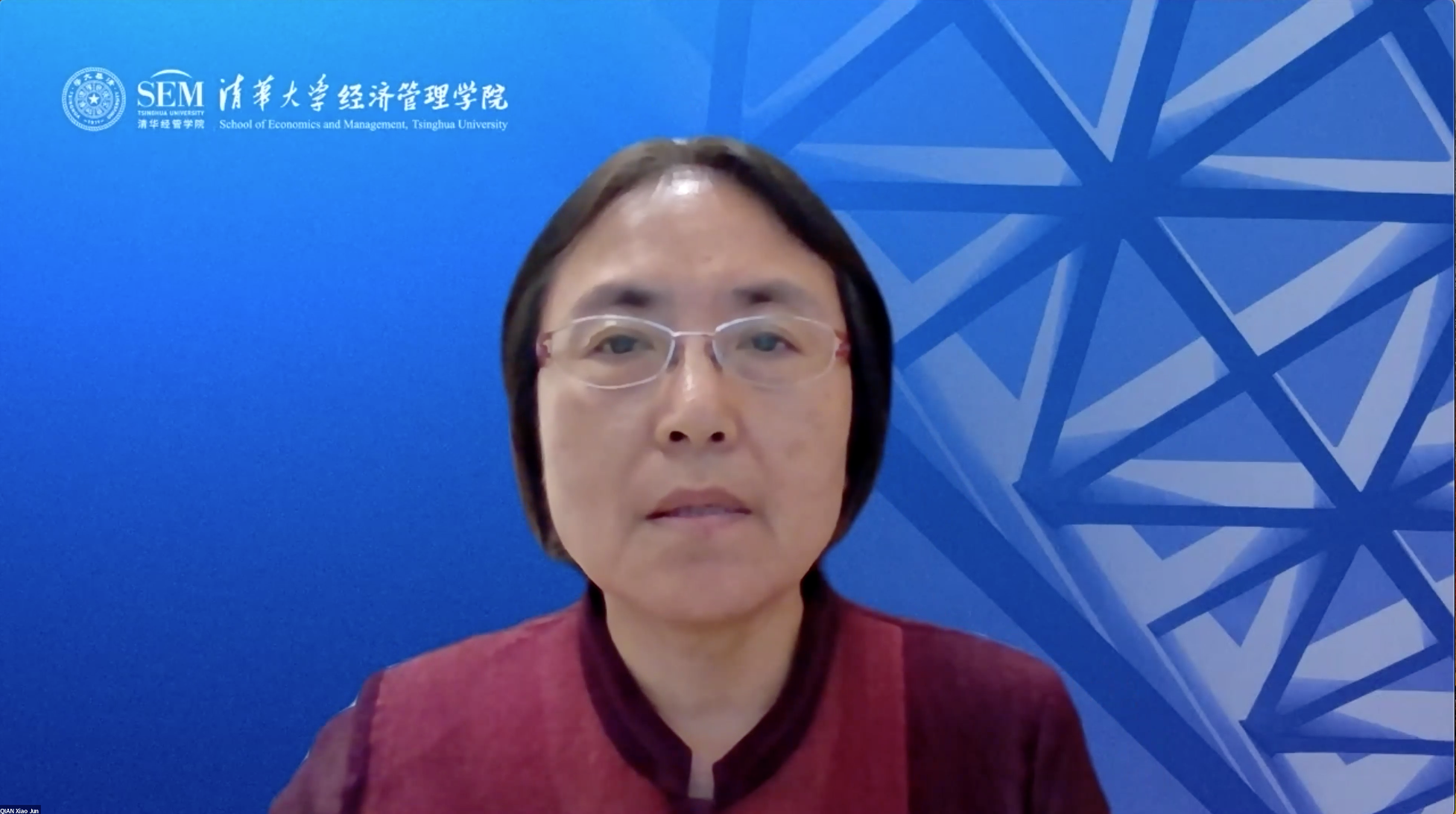
QIAN Xiaojun
In "Thoughts from Policy Makers", attendees heard keynote speeches from ZHU Guangyao, former Vice Minister of Finance of the People's Republic of China and trustee of the IFRS Foundation; Erkki Liikanen, chair of IFRS Foundation Trustees; TU Guangshao, board chairman of Shanghai Finance Institute, former vice chairman of China Securities Regulatory Commission and former vice chairman and president of China Investment Corporation; and ZHU Min, vice chairman of the China Center for International Economic Exchanges, former deputy managing director of the International Monetary Fund and former deputy governor of the People's Bank of China. BAI Chong-En moderated the session.
ZHU Guangyao stressed the importance and wide-ranging ramifications of the creation of an international sustainability disclosure standard. In order to be universally accepted by all parties as a comprehensive sustainability reporting standard, any international sustainability disclosure guidelines must be a comprehensive, objective, and universal set of high requirements. There is still space for improvement in terms of the inclusion, science, and universality of the standards based on the two drafts released thus far. ZHU said he was grateful for IFRS's active promotion of strategic transformation and expansion into the field of standard-setting for sustainable disclosure. He said China would actively support and participate in the development of international sustainable disclosure standards and help to create global benchmarks for sustainable information disclosure.
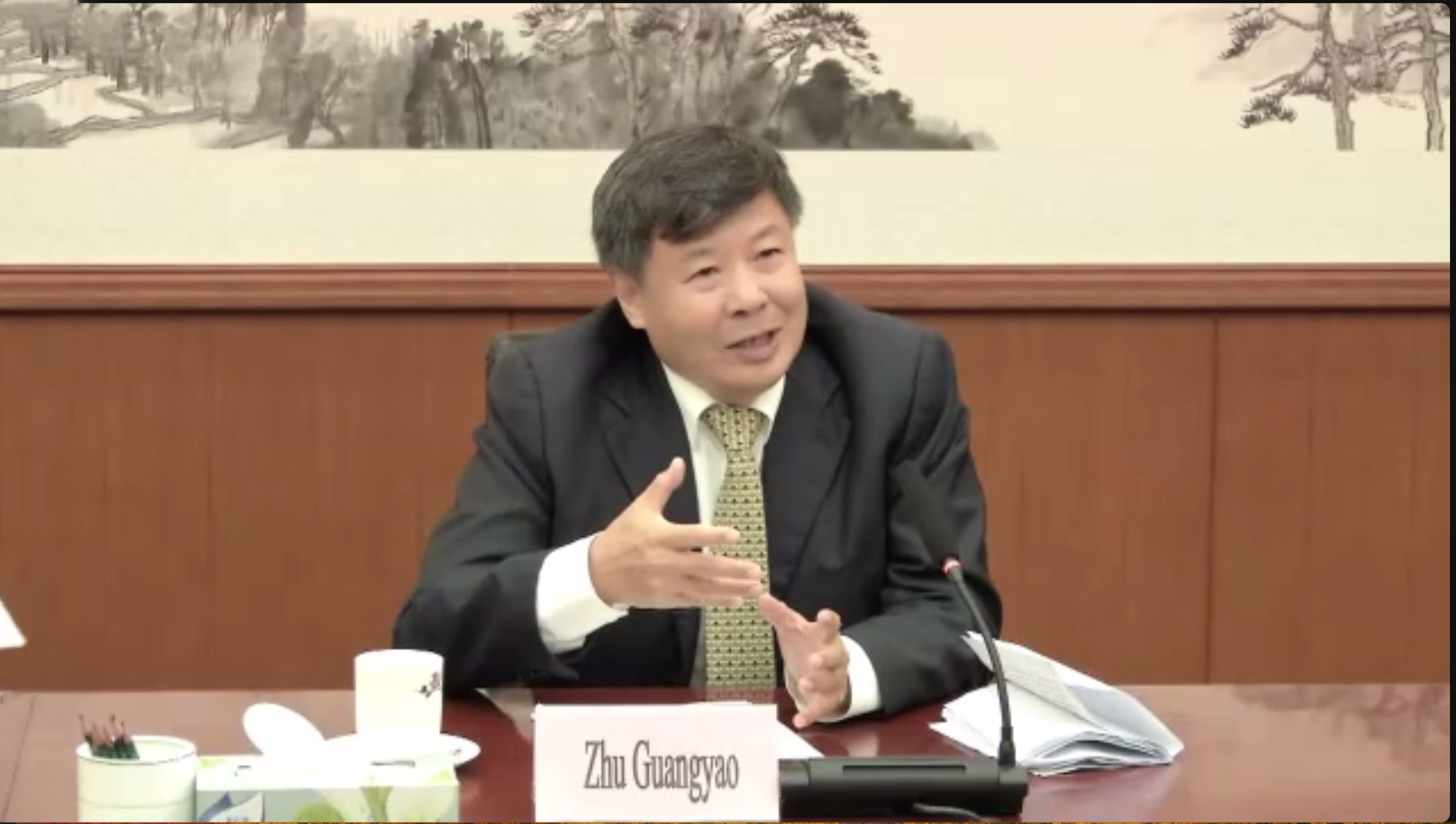
ZHU Guangyao
Erkki Liikanen said the three pillars of the response to climate change and global sustainable development are corporate transformation, public policy, and disclosure of climate risk and opportunity. An institutional framework for the creation of international sustainability disclosure requirements is already established, he said. Liikanen emphasized the significance of developing nations' involvement in raising international standards and said IFRS would make it easier to put the rules into practice at local and national levels through widespread international collaboration.
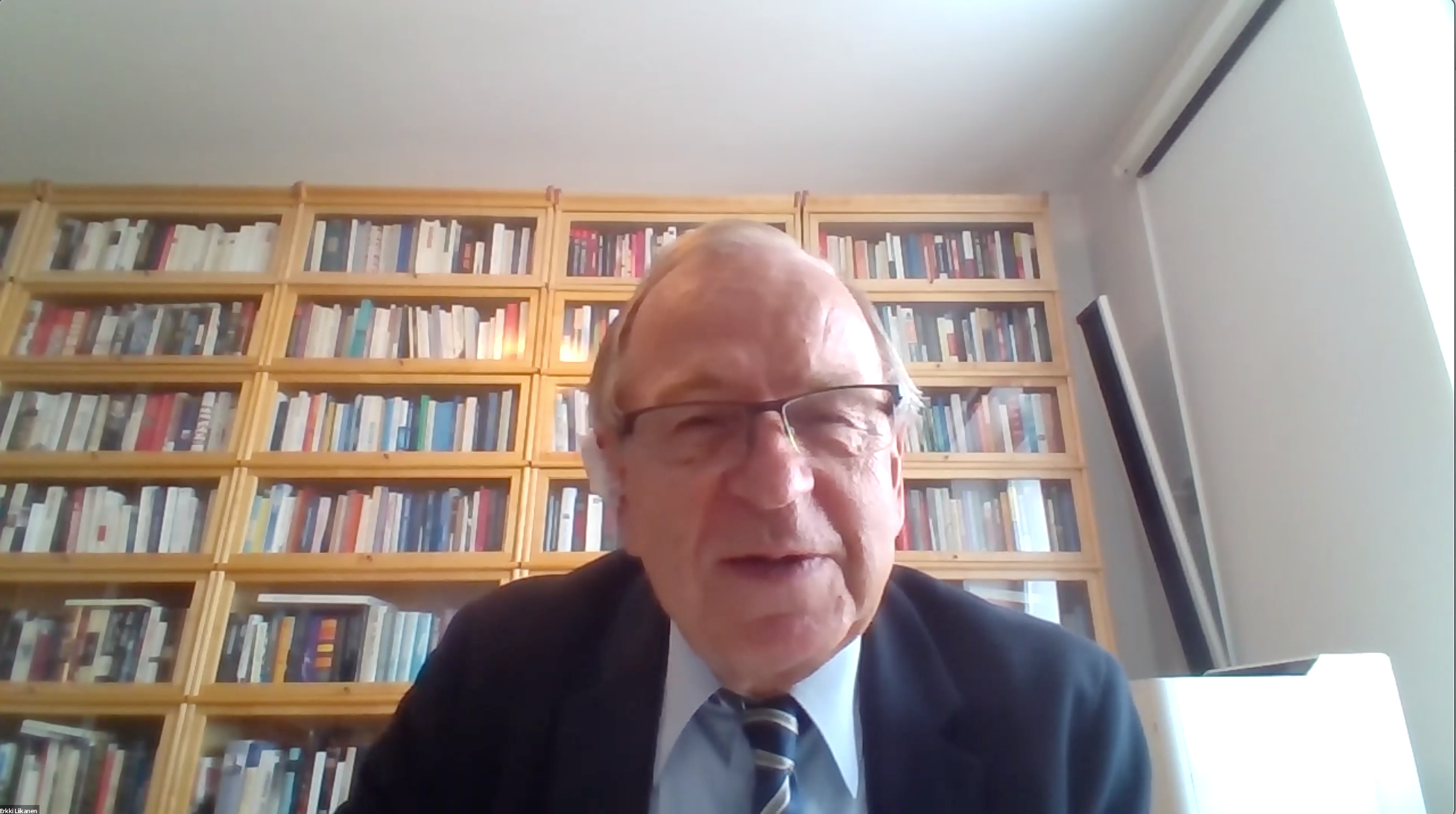
Erkki Liikanen
TU Guangshao presented the development of a sustainable information disclosure system and guidelines for listed companies in China. He said sustainable information disclosure for listed companies in China is encouraged, with special attention for green and low-carbon businesses, domestic and international exchanges and integration, and communication between government and the private sector. TU said the next step is to match the realities of China with the rest of the world, and to gradually combine overall development with voluntary and required disclosure, in addition to make this data accessible and ensure its quality.

TU Guangshao
ZHU Min discussed his findings and ideas for sustainable disclosure from five angles. First, fragmentation will be a problem on a global scale. Second, industry disclosure transformation programs are crucial building blocks for the financial sector's transformation. Third, disclosure frameworks and policies are required from a global perspective. Fourth, it's critical to hear the concerns of SMEs (small and medium enterprises) and comprehend the difficulties they face. Fifth, it is crucial to establish an effective PPP (public-private partnership) model and build a platform that is more beneficial and common to both sides. According to ZHU, in order to create a genuinely international standard through collaborative efforts, China must continue to engage closely with the ISSB and the IFRS Foundation.

ZHU Min
The main forum was followed by two sub-forums.
Erik Berglof, chief economist of AIIB, presided over the first sub-forum, which had the theme "Feedback from Academia" and featured four academics who shared their opinions and engaged in in-depth discussion.

Clockwise from top center: Erik Berglof, HE Kebin, Lucrezia Reichlin, MA Jun, Jong Dae Kim
HE Kebin, professor of the School of Environment at Tsinghua University and dean of the University's Carbon Neutral Institute, argued that the research and adoption of new energy technologies are essential steps toward achieving carbon neutrality and sustainable development.
Jong Dae Kim, professor at the College of Business Administration, director of the Green Finance Graduate Program, and director of the ESG Centre at the Sustainability Management Research Institute at Inha University in Korea, shared feedback and responses from Korean financial regulators and standard-setters on the ISSB guidelines, as well as the impact of international standards on Korean businesses.
The construction and growth of China's green financial system, as well as its connection to transformational finance, were discussed by MA Jun, president of the Institute of Finance and Sustainability and co-chair of the G20 Sustainable Finance Working Group.
While legal systems and public policies are national, capital markets are global, said Lucrezia Reichlin, professor of Economics at LBS and trustee of the IFRS Foundation. Since ISSB is a standard-setter and not an implementer, it is crucial to engage in dialogue with national standard-setters and regulators.
Four panelists participated in the second sub forum, which had the title "Views from Market Participants" and was moderated by Teresa Ko, corporate partner and China chairman of Freshfields Bruckhaus Deringer and co-vice chair of IFRS Foundation.
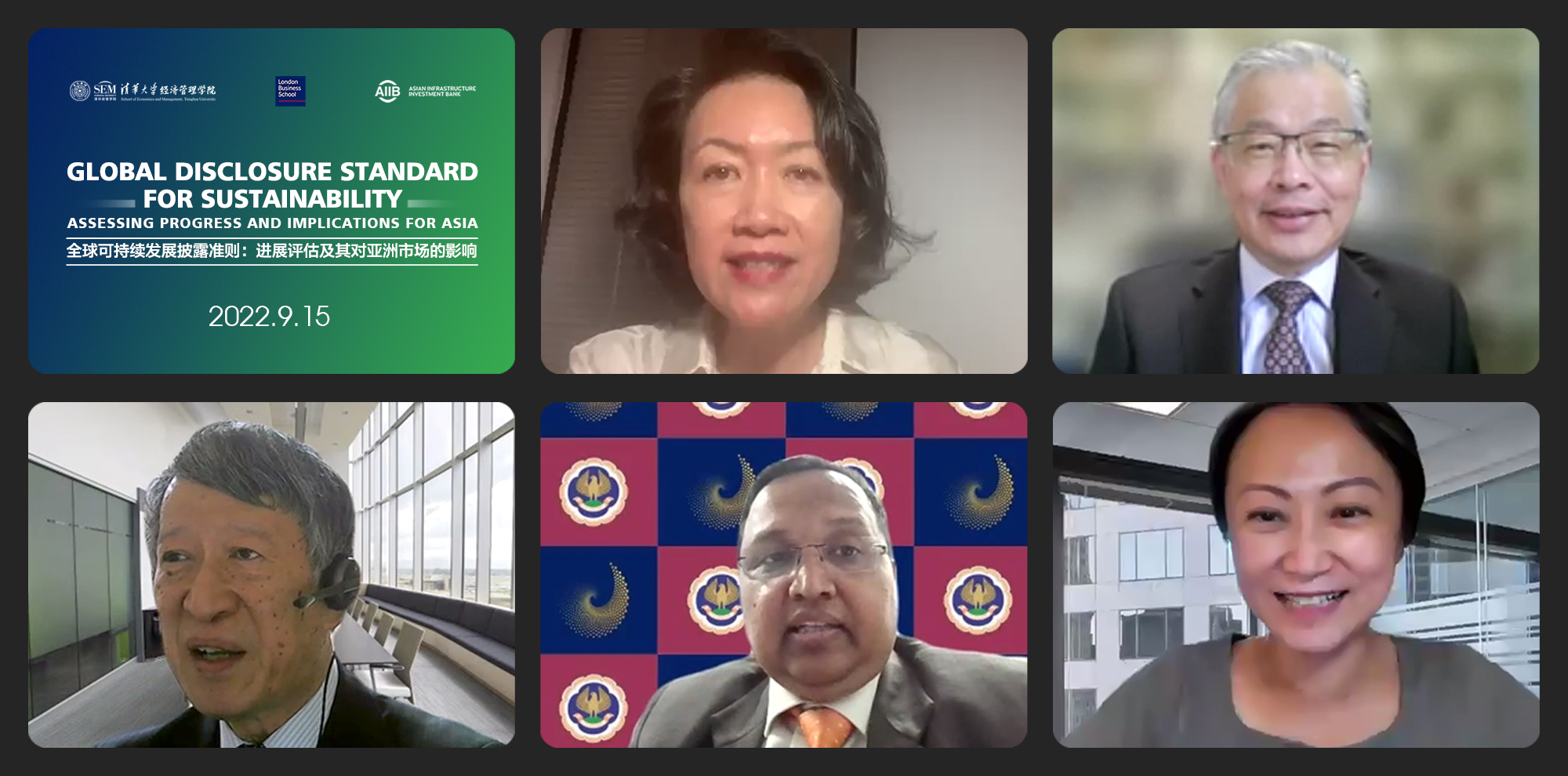
Clockwise from top center: Teresa Ko, ZHANG Weiguo, Yvonne Kam, Sanjeev Singhal, Hideki Kanda
ZHANG Weiguo, visiting professor in Management Practice at Tsinghua SEM, former board member of International Accounting Standards Board, former Chief Accountant and International Director of China Securities Regulation Commission, said ISSB's standards should focus more on thematic standards than industry requirements and should not be aligned with any specific code.
While disclosure standards are being developed quickly, Hideki Kanda, emeritus professor at University of Tokyo and professor of Law at Gakushuin University, said assurance standards must be developed because audit or assurance is crucial to guaranteeing the quality and comparability of such disclosures.
Sanjeev Singhal, chairman of the Sustainability Reporting Standards Board at the Institute of Chartered Accountants of India (ICAI) and Chairman of ICAI Auditing & Assurance Standards Board, shared feedback from Indian stakeholders regarding the ISSB standards and the adoption of local Business Responsibility and Sustainability Reporting standards in India.
Yvonne Kam, technical services partner at PwC Hong Kong and former member of the Chinese Accounting Standards Advisory Committee of the Ministry of Finance of the People's Republic of China, stressed the significance of creating a unique set of standards for SMEs in developing economies and those without public accountability.
As many as 500 online participants from more than 20 countries and regions participated in the six-hour conference. Participants represented the views of Asian politicians, academics, and market participants through their insights and ideas, and furthered the development of clear and accepted sustainable disclosure standards.
About the Institute for Global Development at Tsinghua University
Established in 2016, The Institute of Global Development at Tsinghua University (IDG) is a university-level research institution. IGD is strategically positioned to develop a world-class high-end think tank in the field of global development and global economic governance. Its research focuses on five strategic areas in global common development and global economic governance: economic development and anti-poverty action, international financial governance, international economic and trade relations, digital economy and global climate change.
Source: The Institute of Global Development at Tsinghua University
Editor: REN Zhongxi
 Latest News
Latest News